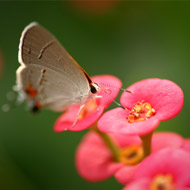Climate change set to cause serious habitat loss for insects

If temperatures rise by 3ºC, Prof Warren said ecosystem services would be “greatly reduced”.
Nearly 50 per cent of insects are on course to lose half of their range, if current climate predictions are correct.
This is according to new analysis led by the University of East Anglia, published in the journal Science.
Scientists say that limiting global warming to 1.5ºC would avoid half of the risks associated with warming of 2ºC for plants and animals, and two-thirds of the risks for insects.
The study suggests species around the world would benefit, but especially those in Southern Africa, the Amazon, Europe and Australia.
A research team from the UEA and James Cook University in Australia studied around 115,000 species, making this the largest study of its kind. It is also the first to look at how limiting warming to 1.5ºC could impact species globally, including insects.
Lead author Professor Rachel Warren said: “Insects are particularly sensitive to climate change. At 2ºC warming, 18 per cent of the 31,000 insects we studied are projected to lose more than half their range.
“This is reduced to six per cent at 1.5ºC. But even at 1.5ºC, some species lose larger proportions of their range. The current global warming trajectory, if countries meet their international pledges to reduce CO2, is around 3ºC. In this case, almost 50 per cent of insects would lose half their range.”
Insects are vital for ecosystems and humans as they pollinate crops and flowers, provide food for higher level organisms and break down detritus. If temperatures rise by 3ºC, Prof Warren said ecosystem services would be “greatly reduced”.
The study also suggests that if warming is limited to 1.5ºC by 2100, more species will be able to maintain or even gain in range. If, however, warming reaches 2ºC by 2100, Prof Warren said many species will not be able to keep up and far more will lose large parts of their range.



 The Animal and Plant Health Agency (APHA) has updated its online reporting service for dead wild birds.
The Animal and Plant Health Agency (APHA) has updated its online reporting service for dead wild birds.